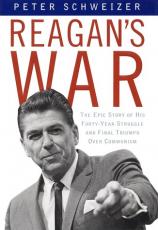Reagan's War: The Epic Story of His Forty Year Struggle and Final Triumph Over Communism
Review
Reagan's War: The Epic Story of His Forty Year Struggle and Final Triumph Over Communism
REAGAN'S WAR begins with a terse retelling of the "Battle of
Hollywood," a violent 1946 strike by a Communist-controlled labor
union against the Warner Brothers studio. The strike fizzled, as
did the Communist attempt to take over a studio. From the
perspective of the Kremlin, it must have seemed like a small defeat
at the time. But the unintended consequence of that strike was that
an actor on the Warner lot, Ronald Reagan, began to realize that
Communism posed a serious threat to American liberty.
REAGAN'S WAR tells the story of how Reagan developed his commitment
to rolling back Communism and how his policies resulted in a fatal
blow to the evil Soviet empire.
REAGAN'S WAR is not a biography, but a reexamination of Reagan's
life through the narrowing prism of anti-Communism. Loyal
Reaganites will find little emphasis on Reagan's tax-cutting
fervor, or the resulting economic expansion. Critics of the Reagan
Administration may be disappointed that Iran-Contra is mentioned
only briefly (and Lieutenant Colonel Oliver North only once). But
the readers who will be the most dissatisfied --- if they read the
book at all --- will be the former Communist elite in the former
Soviet Union.
For them, REAGAN'S WAR will bring back only painful memories of
tyranny past.
The part of the book that will most educate readers deals with
Reagan's formative experiences in anti-Communism, placing his
evolving worldview in counterpoint with the aggressive tactics of
the Kremlin. While Communist satellite governments were
consolidating their hold on Eastern Europe, Reagan recorded
fundraising appeals for what would become Radio Free Europe and
helped build Democratic support for Dwight Eisenhower. While
Communism was toppling dominoes in Southeast Asia, Governor Reagan
was confronting student protesters at Berkeley. While Nixon and
Kissinger were laying the groundwork for detente, Reagan was
advocating a more confrontational strategy, and preparing for a run
at the Presidency.
REAGAN'S WAR provides an in-depth analysis of Reagan's economic and
political maneuvers that led to the downfall of the Soviet Union.
Author Peter Schweizer describes how Reagan coupled his legendary
ability to communicate with his principled leadership and his
unwavering faith, and shows how these characteristics were
essential in his efforts to roll back Communism. Although his
critics constantly accused Reagan of being a warmonger, Schweizer
shows that his greatest victories were not in the battlefield but
at the conference table. The last chapter of the book summarizes
the efforts to cause the economic collapse of the Soviet Empire,
showing billions of dollars lost by the Soviet economy due to
military spending, Western economic sanctions, and aid to Cuba and
Eastern Europe.
Schweizer's conclusions are buttressed significantly by his
research in newly opened secret archives. We learn, unsurprisingly,
that the peace movement in West Germany was supported and
controlled by the East German secret police. We hear the complaints
of Soviet leadership that the Reagan Administration would not shift
its policies for political advantage, and worries that Reagan's
spread of "anti-Soviet ideas" would prove decisive. There is even a
too-brief mention of a North Korean threat to assassinate Reagan
during a visit to South Korea. Schweizer also adds the Soviet
perspective of summit meetings in Geneva and Reykjavik, and details
the effect of Reagan speeches on the Russian dissident
community.
REAGAN'S WAR is a popular, rather than a scholarly treatment of its
subject. There is less detail than some readers would like about
particulars, such as Reagan's relationship with Mikhail Gorbachev,
and the decision to pursue missile defense. The book's positive,
aggressive defense of the Reagan record causes it to overlook some
important issues. For example, the invasion of Grenada is presented
without reference to the bombing of the Marine barracks in Beirut,
which immediately preceded it. The recounting of the arming of the
Afghan resistance fails to take
into account the unintended consequences of that decision, which
are still ongoing as of this writing.
However, the purpose of REAGAN'S WAR is not to criticize, but to
celebrate a great victory and the great leader who is responsible
for that victory. It accomplishes that purpose brilliantly,
compiling Reagan's efforts against Communism into a unified whole,
and further burnishing the Reagan legacy in the process. It is a
valuable and important book for students of the era or students of
leadership.
Reviewed by Curtis Edmonds (curtis@txreviews.com) writes movie reviews at http://www.txreviws.com/ on January 23, 2011
Reagan's War: The Epic Story of His Forty Year Struggle and Final Triumph Over Communism
- Publication Date: November 30, -0001
- Genres: History, Nonfiction
- Hardcover: 288 pages
- Publisher: Doubleday
- ISBN-10: 0385504713
- ISBN-13: 9780385504713




